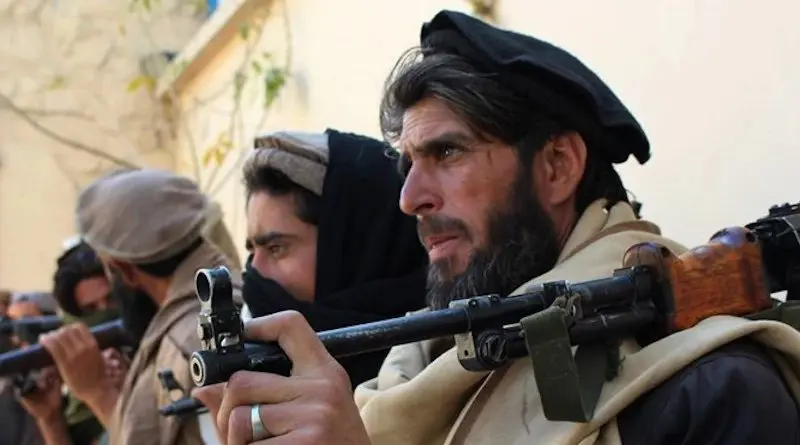Afghanistan: Taliban Claim Victory Over Resistance, Massoud Vows To Continue Fight
By VOA
By Ayesha Tanzeem
The Taliban said road links to Panjshir valley are now open, and food and other supplies can now be transported. Soon after declaring they had taken over the valley and ended remnants of resistance against their rule, the group said electricity, cellphone and internet services would be restored soon.
“Thank God that we do not have civilian casualties in our fight to capture and conquer Panjshir,” Taliban spokesman Zabiullah Mujahid said in a press conference in Kabul on Monday.
The Taliban have taken over the provincial capital and the governor’s compound in the valley and shared videos of their fighters in the capital.
Meanwhile, in an audio message on his Facebook page, resistance leader Ahmad Massoud said his forces are still present in Panjshir and will continue to fight the Taliban.
Earlier in the day, pro-resistance Twitter accounts claimed their fighters retreated to the mountains to regroup but that they will continue to fight.
“Last night, we had to make a hard decision in the face of furious enemy attacks and depleted amunations (sic),” said their Twitter message posted Monday afternoon. “Make a last stand in Bazarak and risk the total elimination of our leadership, or retreat to higher ground in order to continue the resistance. We choose the latter.”
Another message, posted at the same time, said their leaders were safe and in good spirits.
“We are on a terrain that we know and best suits the next chapter of our resistance. We know what we are doing! This was expected!” the tweet said.
Massoud is the son of Ahmad Shah Massoud, the Northern Alliance leader who successfully resisted Taliban rule in the 1990s and was nicknamed the “Lion of Panjshir.”
Mujahid said those in the resistance who wanted to return to a normal life in Afghanistan were welcome, but efforts to undermine the new Taliban regime would be considered sedition and dealt with accordingly.
He said work for the formulation of a new Taliban government was complete, but the announcement was delayed since some technical issues remained.
The new ministers, the Taliban spokesman said, might be considered acting ministers to give the government the flexibility to enact changes if needed. He also assured journalists that Taliban chief Hibatullah Akhundzada was alive and would appear in public soon.
Akhundzada’s public absence has given rise to rumors of his death. Taliban founder Mullah Omar had been dead for two years before news of his demise leaked in 2015.
Mujahid also asked women and men to refrain from protesting while the country was going through a transition.
“Why are you protesting at a time when the new government has not taken over yet? We have seen the protests by women. We are trying, and we hope to resolve their issues as soon as possible,” he said.
On Saturday, Taliban fighters in Kabul forcefully broke up a protest by a group of women demanding equal participation in the government. Protesters said the Taliban beat some of them with the butt of their guns, leaving them bloodied, as seen on their social media videos and testimonies.
Mujahid said gatherings of people could become a security issue.
“As you saw, the Kabul airport had a lot of chaos, and then there were horrible attacks there in which foreigners also died,” he said.
A suicide bomb blast at the airport last month, as thousands of Afghans were clamoring to enter the premises in hopes of getting on one of the U.S. or European evacuation flights, left at least 169 Afghans and 13 Americans dead.
The attack was claimed by Islamic State Khorasan Province, the regional chapter of IS. It was considered the first big challenge for the Taliban, who had promised that no terrorist group would be able to use Afghan soil against any other country under their watch.
In Monday’s press conference, Mujahid also promised swift restoration of the Kabul airport with the help of Qatar, Turkey and the United Arab Emirates.
“I want to assure you that the airport will be ready for flights soon,” Mujahid said, pointing out that some local flights from Kabul to other Afghan cities had already resumed but work was needed to repair the radar system that he claimed was damaged, along with some other equipment, by U.S. forces before they left.
Hinting at Taliban foreign policy going forward, especially at the Taliban’s interest in the Chinese One Belt One Road (OBOR) initiative, Mujahid said given its economic might, China could play a very important role in the reconstruction of Afghanistan.
“The CPEC (China-Pakistan Economic Corridor) project is important for entire Asia, including Afghanistan. If the CPEC route goes through Afghanistan, we would cooperate,” Mujahid said.
CPEC is an arm of the OBOR project, which links northwest China’s Xinjiang province through Pakistan to the Arabian Sea. China has hinted it wants to extend the project to central Asia.
Mujahid also responded to questions on the visit to Kabul over the weekend of Pakistan’s intelligence chief, General Faiz Hameed, the first senior foreign official to visit the Afghan capital since the Taliban takeover.
He said the visit was focused on Pakistan’s concerns over multiple jail breaks during the Taliban’s takeover of Afghanistan and the release of prisoners involved in militant attacks in Pakistan.
According to Mujahid, Kabul’s security would now be handed over to the Taliban in uniform. Discussing the fate of the former Afghan security forces and military, the Taliban spokesman said they will be merged with Taliban fighters into security forces for the new government.

